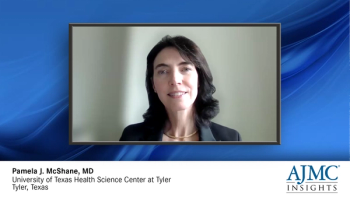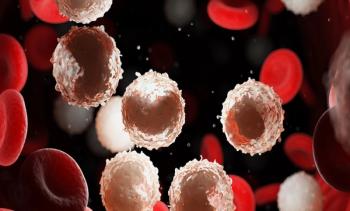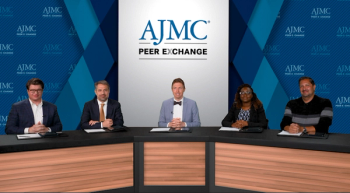
Clinical
Latest News
Latest Videos

CME Content
More News

Investigators said both reflexology and acupressure led to similar improvement in patients after 4 weeks.

The introduction of momelotinib to treat myelofibrosis with anemia can result in small savings due to reduced transfusion-related costs, according to a budget impact model.

Patients with radiographic axial spondyloarthritis (ax-SpA) and a high risk of radiographic progression had similar low progression on both secukinumab and an adalimumab biosimilar.

Researchers explain that these insights have important implications, if validated in further research, as challenges with early detection of dilated cardiomyopathy complicate myasthenia gravis (MG)-prognosis.

Treatment and management of multiple myeloma (MM) is continuously evolving, and in this analysis, investigators discuss ever-present issues and potential solutions to optimize care for this patient population.

Results from the V-INITIATE trial showed a substantial 60% reduction in low-density lipoprotein cholesterol (LDL-C) from baseline to day 330 in the inclisiran first group compared with a mere 7% reduction in the usual care group.

Young breast cancer survivors without a specific genetic mutation have a lower risk of developing second primary breast cancer within 10 years of diagnosis.

The rate of relapse among patients with TP53-mutated myelodysplastic syndrome (MDS) or acute myeloid leukemia (AML) was similar among those who underwent allogeneic hematopoietic stem cell transplant vs those who did not.

Positive responses seen following experiments involving metastasis-associated in colon cancer 1 (MACC1) indicate that the biomarker can be used to better diagnose and treat patients with pulmonary arterial hypertension (PAH).

A medical professional explores the management of bronchiectasis exacerbations, detailing the significance of sputum color, the potential for hemoptysis, and the exacerbation of comorbidities such as COPD and asthma.

Decreased body mass index (BMI) in patients with chronic obstructive pulmonary disease (COPD) was linked to a higher risk of severe exacerbations and all-cause mortality, emphasizing the importance of monitoring BMI for managing COPD and predicting outcomes.

The data showed notable responses, even among patients living with chronic lymphocytic leukemia (CLL) who had previous exposure to B-cell receptor–associated kinase inhibitors, the authors said.

Results presented at the National Community Oncology Dispensing Association International Spring Forum describe meaningful improvements in functioning among patients who received the oral gamma secretase inhibitor to treat progressing desmoid tumors.

Panelists discuss desired innovations in health care technology, as well as incentives to further integrate these new technologies into patient care.

Panelists discuss technological developments, including virtual visits and mobile health, and their role in improving cardiovascular care.

A professional discussion on diagnosing type 1 diabetes based on autoimmune antibodies, oral glucose tolerance test results, fasting glucose, and hemoglobin A1C levels.

Overall survival and complete response rates were comparable across a younger and an older cohort of patients with relapsed/refractory diffuse large B-cell lymphoma (DLBCL).

In this investigation, investigators sought insights into the safety and efficacy of chimeric antigen receptor (CAR) T-cell therapy in acute myeloid leukemia (AML), with a particular focus on how various patient subgroups fared for complete remission (CR).

Medical doctors discuss the future of Philadelphia chromosome-positive acute lymphoblastic leukemia (Ph+ ALL) and their five-year outlook for advancements and potential cures for the disease.

Medical doctors discuss the future of Philadelphia chromosome-positive acute lymphoblastic leukemia (Ph+ ALL) and their five-year outlook for advancements and potential cures for the disease.

Lawrence Eichenfield, MD, of Rady Children's Hospital - San Diego, discusses the implications of the findings from INTEGUMENT-PED, the phase 3 study assessing the efficacy and safety of once-daily roflumilast cream 0.05% in pediatric patients with atopic dermatitis (AD).

Pregnant female patients with rheumatoid arthritis (RA) treated with methotrexate and leflunomide within 3 months of conception faced an increased possibility of adverse pregnancy outcomes, specifically stillbirth or abortion.

Krystyn Van Vliet, PhD, of Cornell University, discusses the scalability of 3D platforms in multiple sclerosis (MS) drug discovery and compares their costs with those of other drug discovery methods.

Raajit Rampal, MD, PhD, of Memorial Sloan Kettering Cancer Center, discusses the potential of a disease-modifying therapy in polycythemia vera, treating high-risk vs low-risk patients, and emerging therapies in the pipeline.

Analyzing trends from online conversations among patients with myasthenia gravis (MG), researchers found that issues with current treatments were mentioned in nearly 24% of conversations.
















